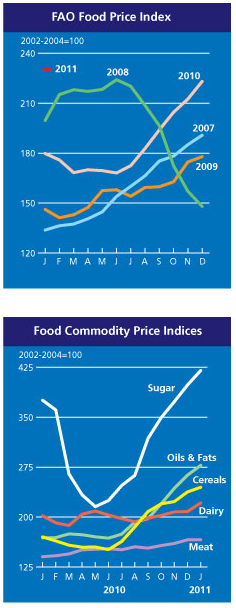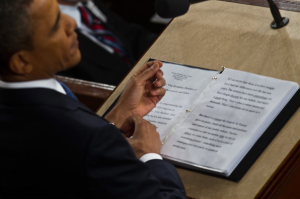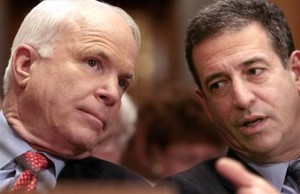Once again, and for the last time before the 2012 election gives me a heart attack, I return to offer my thoughts on President Obama’s State of the Union address.
These days, I spend most of my spare time reading about the ragtag gang of misfits in the GOP nominating contest. I also nervously refresh Nate Silver’s 538 Election Models, and watch the ferris wheel of idiocy that is the RCP polling index.
Because I am a self-hating glasses-wearer who avoids MSNBC, I don’t even know the latest Democratic talking points. Of course, the bar has been set so low by GOP election rhetoric that just hearing the word “regulation” without the prefix “job-killing” will be bliss. I also look forward to an audience that won’t boo the very existence of minorities or Mexico. I even have my sunglasses ready to protect my eyes from John Boehner’s day-glo skin.
Christ, it’s been so long that I barely remember our country’s actual issues. Education? Infrastructure? Unemployment? Environment? Either way, time to see if President Obama can remind the 54% of Americans who disapprove of his performance why we elected him in the first place.
* * * *
The Speech:
Can you tell it’s election year? In a sweeping, occasionally feisty speech that (unofficially) kicks off the 2012 campaign, President Obama dove headfirst into the populist waters of job creation and tax reform. Overall, I thought the speech was effective, if a bit long. But let’s dive into the substance.
Foreign Policy: Obama kicked off with what is (in my opinion) his single greatest accomplishment: ending the war in Iraq. Yes, the war was unpopular from nearly the beginning. But people scream bloody murder when any sort of defense cuts are on the table, and you know opposition must have been tough when candidates like (oops… I forgot his name) even advocated going back in. President Obama also touted the assassination of Osama Bin Laden in his opening, to raucous applause. Obama is clearly trying to remind the extra 5% of people who approved of him for a month following the assassination and then resumed hating his guts that he shares their thirst for terrorist blood. Still, it is one feat the GOP can’t possibly diminish, so it makes for good stumping.
Later in the speech, Obama turned to the issue of Iran just long enough to say that he was keeping “all options on the table” but that a peaceful resolution was still possible. And whereas I’m sure this did not satisfy the hardcore republicans tripping over themselves to bomb Iran into the Atone Age, I have to think that at least some Americans recognize that we can’t possibly afford another war. Obama even took the time to laud our iron clad — iron clad — relationship with Israel. I am sure repeating the adjective twice will earn him points tomorrow at his daily meeting with Netanyahu.
Manufacturing: The President waxed poetic on his hopes for the rebirth of American manufacturing. I have my doubts that the United States will return to being a manufacturing powerhouse with our relatively high labor and environmental costs. However, this is election season and nothing sells better than the idea that, with a few tweaks, companies will gladly pay a thousand times more for fat Ohioans who get weekends and holidays. Don’t get me wrong, I am very much in favor of restructuring our tax code to encourage job creation — it’s just a process that will prove far more arduous than either party cares to admit.
Obama’s tax proposals, most involving cuts for manufacturers who hire domestically (and penalties for those who hire abroad) are ripped right from the GOP playbook. Indeed, much of the address played out as a paean to the American worker, and, for long stretches, I wouldn’t have been able to distinguish it from a Romney stump speech. That is, until he showed his hand by hinting that the government might help play a part in recovery by “turning our unemployment system into a reemployment system.”
Education: The President’s education remarks were pretty uninspired, but it did make me reflect on how little I’ve heard of the issue lately. Lost in the GOP war drums of tearing down the government, we have a systemic crisis of education ranging from achievement gaps in distressed communities to higher education that is bankrupting the middle class. Obama addressed both in sweeping fashion, making the usual points about teacher accountability and school funding. He also threatened to withhold federal funding to universities that didn’t slow tuition growth. Perhaps most importantly, he urged Congress to keep money in federal aid programs. It will be important moving forward to remind the American people that, in many cases, government spending can do a lot of good — and students about to see rate increases because of Tea Party intransigence will learn that lesson the hard way.
Energy: Obama walked carefully here, pledging explicitly to open up oil reserves before calling for an “all of the above” energy strategy that, I suppose, implicitly contains all of the energy resources we should be focusing on. I am mildly annoyed that solar and wind were mentioned once each, while natural gas and oil were discussed extensively. Such is the nature of election year pandering. Of course, the first words from this idiot‘s mouth following the speech (yes, I watched it on Fox News) criticized the lack of Keystone Pipeline in the speech. Does anyone else remember a time when we cared about the noble caribou instead of maximizing our domestic drilling? At least Obama had the courtesy to drop the understatement of the century so far: “The differences in this chamber may be too deep right now to pass a comprehensive plan to fight climate change.”
Deficit: “Take the money we’re no longer spending at war, use half of it to pay down our debt, and use the rest to do some nation-building right here at home.” Amen. If I had to sum up my policy prescription for America in one sentence, this would be it.
Milk Spill Joke: Not Bad
Congress: Remember these?
- “Send me a bill that bans insider trading by Members of Congress, and I will sign it tomorrow.”
- “Send me these tax reforms, and I’ll sign them right away.”
- “Send me a law that gives them the chance to earn their citizenship. I will sign it right away.”
- “Send me a bill that creates these jobs.”
- “So put them in a bill, and get it on my desk this year.”
On one level, these requests smack of naivete; after all, we know that the Republican House would never contemplate useful legislation. Even if they agreed with it, they couldn’t risk letting Obama reap any benefit. However, I think the strategy is more subtle; it reminds the American people that the biggest obstacle to significant political progress are the clowns in Congress. Not that they need much reminding, as Congress is less popular than Communism.
Moreover, it’s important for LIBERALS to remember that Obama’s supposed ineffectiveness comes largely from the recalcitrance of Congress rather than his philosophical shortcomings. There are few things Obama has exclusive control over, and reminding Americans of that will only help him. Of course, all of this may be wishful thinking; perhaps people in the White House are just too lazy to draft up bills.
Shameless Lincoln Plug: I’ll take it over another goddamn Reagan reference.
The Big Finish: To close out, Obama again returned to the Osama story, using it as a metaphor for the importance of sticking together as a country. As Obama opined, “Each time I look at that flag, I’m reminded that our destiny is stitched together like those fifty stars and those thirteen stripes.” Although lines like that will always make a liberal elitist cringe, it is a vastly better campaign strategy than telling it like it is. If the 2012 election must be won by winning over the generally-apathetic flag-waving masses, then so be it.
* * * *
The State of the Union is always an exercise in platitude. Indeed, you can simply cobble together old ones and make a serviceable speech. But now is not the time to overly scrutinize its contents. It is election year. Any liberal with a pulse should be trying to figure out how to prevent Republicans from dismantling the moderate progress President Obama has made in health care, banking regulation, foreign policy, and the rest. My own frustrations with President Obama have ebbed and flowed, but I am frightened daily by the alternative.
Some day, the progressive movement will again gain political traction in America. Until that day, however, it is far better to stand against the irrational rightwing than to submit to apathy. The speech tonight was a worthy opening salvo in our upcoming electoral struggle, and that is all that matters. Now if you’ll excuse me, I have poll numbers to cringe at.








